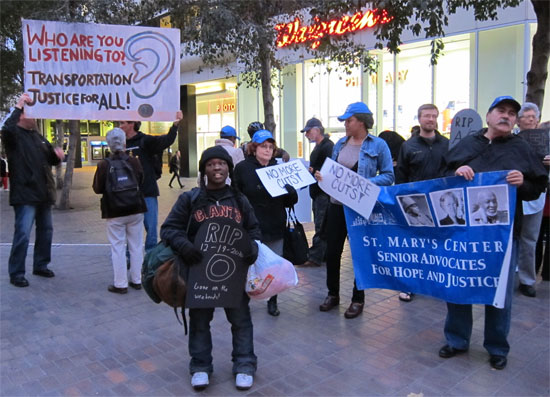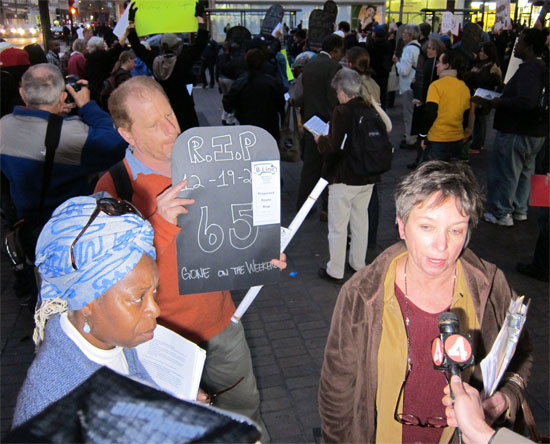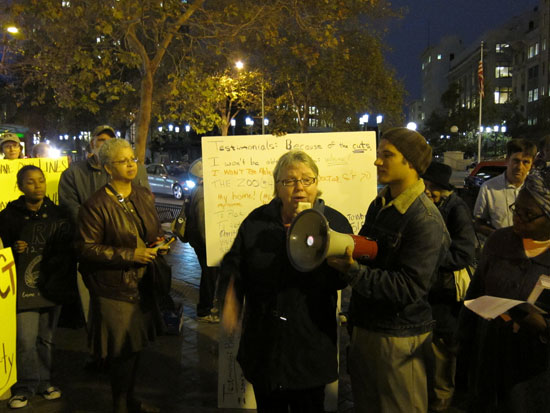
AC Transit riders took solace in the news on Tuesday that the agency plans to restore service that was cut twice this year after a labor arbitrator settled a contract dispute. Transit advocates worry, however, about the agency's long-term solvency and have called on elected officials to develop significant revenue measures for funding buses in the East Bay.
The arbitration panel in the AC Transit labor negotiation reached a decision on a contract between the transit district and Amalgamated Transit Union Local 192, which represents 1,750 of its bus drivers and mechanics, saving the agency $38 million over three years. The binding decision calls for increased contributions from the members to their health and benefit plans, as well as work rule and holiday changes.
AC Transit had cut service in March by 7.8 percent, or $10.3 million in service hours and in October by 7.2 percent, or $11.4 million in service hours. Fare increases this year amounted to an increase of 25 cents per trip for local riders and $10 for the price of a monthly pass. Transbay riders have been paying an increase of 50 cents per trip and $16.50 for a monthly pass. Youth, senior and disabled riders saw a hike of 15 cents per local trip and 30 cents for Transbay trips.
Because of the arbitration decision, AC Transit also expects to halt an additional round of cuts approved to go into effect in December, including the elimination of weekend service on lines affecting nearly 25,000 riders, what transit advocates and church groups lamented as a "death spiral."
"There are no winners or losers in this arbitration," AC Transit Interim General Manager Mary King said in a statement. "Both AC Transit and the union focused on what is best for the riders and taxpayers of this district and what is in the long-term interest of maintaining public transit for the people we serve."

Though transit advocates were pleased with the impact on service in the near term, they lamented the agency's inability to improve service above restoring recent cuts and worried similar budget deficits would return imminently.
A coalition of community groups and church leaders rallied this week to kick off a campaign calling on elected officials throughout Alameda County to fight for increased operating funds for AC Transit with the same vigor they stumped for capital projects like the Oakland Airport Connector. Many of the groups in the coalition, like Urban Habitat, Public Advocates and Genesis, fought the Metropolitan Transportation Commission (MTC) and BART over spending federal stimulus money on the OAC. They've created a pledge they hope to get Alameda County elected officials to sign, promising to do everything in their power to improve AC Transit's financial situation.
"We don't see [labor concessions] as a long-term sustainable solution to AC Transit's funding problems," said Bob Allen, transportation policy director for Urban Habitat. "It gets us out of the latest round of really serious cuts. It doesn't get us off the trend that we have going forward, with MTC, the state and the federal government not providing adequate operations funding. This is a short term solution that is balanced on the backs of people who work, push the system forward, put service on the street."
Allen said the MTC had funded "mega-projects" throughout the region to the detriment of keeping buses running. "We want to see the same kind of effort to get funding to put service on the street, to reach our climate change goals, to get kids to school and get people to work."
At the rally, the coalition got commitments from Assemblymember Nancy Skinner, Alameda County Supervisors Keith Carson and Nate Miley, as well as Gayle McLaughlin, the newly elected Mayor of Richmond.
"We don't need to keep widening our highways. We realize that only impacts public health with more pollution and only drags us further into the global warming crisis we're in," said McLaughlin, to loud applause."We need it understood that mass transit is the wave of the future, is for the needs of our community and is something that is just. I love the words 'transportation justice.' Let's keep pulling together for transportation justice."
McLaughlin talked of her own city's general plan, but said they couldn't achieve the benefits of smart growth, emissions reductions and improved health without AC Transit.
"What good is it to have transit-oriented development if you don't have the transit?" she asked.

Mashasin Abdul Salaam, co-chair of the Genesis Transportation Task Force, applauded the politicians who stepped up to sign the pledge, which reads simply, "I stand in solidarity with AC Transit's ridership. I pledge to do anything within my power to fight continuing service cuts and fare increases. I will continually endeavor to restore AC Transit's service to its pre-2010 levels and to fight against the gradual diversion of AC Transit's resources."
Salaam and the coalition called out the political leadership who were ardent supporters of the OAC, what Salaam called "the skytram," saying they had not done enough to adequately fund AC Transit. The politicians included Oakland Mayor Ron Dellums, Oakland Councilmember Larry Reid, Alameda County Supervisor and MTC Chairman Scott Haggerty, Alameda County Transportation Commission Chair Mark Green, State Assemblyman Sandre Swanson, U.S. Representative Barbara Lee and U.S. Senator Dianne Feinstein.
Urban Habitat's Allen called it the "optics" of press events for new capital construction versus job preservation.
"I think a lot of people feel it doesn't look as good to stand beside a bus driver in the morning and say this bus driver wasn't cut. Preserving jobs is not looked at the same as 'creating' them," said Allen.
"It's a problem of how people operate politically, what things feed what constituencies and ultimately is there enough power in the communities that are affected that they'll stand up," said Allen. "I think political officials look at those capital projects as serving people who vote more. If they're putting up a project that gets people to work but also attracts voters, maybe more middle class voters, more affluent voters, more white voters who tend to come out, that plays better to those people, in their minds."




